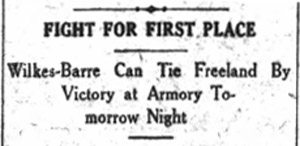
News & announcements
Saving your history
Early accounts
Maps
Nearby towns
People
Churches
Schools
Municipal
Organizations
Businesses
The mines
Transportation
Streets
Buildings
Entertainment
Celebrations
Sports
Ethnic groups
Penn State League
What's on this page:
- Freeland basketball - the Penn State League
The narrative on this page comes from Ed Merrick, who painstakingly searched old newspapers to pick out the story for basketball fans of the Penn State League and Freeland’s participation, from the legendary "All Home Five" to first place standing in the mid-1930s when the League was revived.
Before we read Ed's text, let me post this photo and caption which are also posted on the Basketball page:
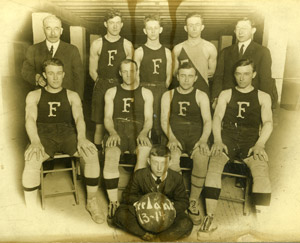
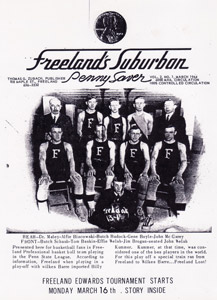 Freeland Pros
basketball team 1913-1914. Back row: Dr. Maley, Alfie Biscowsi,
Butch
Hudock, Gene Boyle, John McGarey -- front row: Butch Schaub, Tom
Baskin, Effie Welsh, Jim Brogan, seated John Welsh. Photo from John
Zubach. The Freeland Historical Society had this photocopy of the front
page of the Freeland Penny
Saver 2(1): March, 1964 where it was published, with this caption.
"Presented here for basketball fans is
Freeland Professional basket ball team playing in the Penn State
League. According to information, Freeland when playing in a play-off
with Wilkes Barre imported Billy Kummer. Kummer, at that time, was
considered one of the best players in the world. For this play off a
special train ran from Freeland to Wilkes Barre … Freeland Lost!" Photo
courtesy of the Freeland Historical Society.
Freeland Pros
basketball team 1913-1914. Back row: Dr. Maley, Alfie Biscowsi,
Butch
Hudock, Gene Boyle, John McGarey -- front row: Butch Schaub, Tom
Baskin, Effie Welsh, Jim Brogan, seated John Welsh. Photo from John
Zubach. The Freeland Historical Society had this photocopy of the front
page of the Freeland Penny
Saver 2(1): March, 1964 where it was published, with this caption.
"Presented here for basketball fans is
Freeland Professional basket ball team playing in the Penn State
League. According to information, Freeland when playing in a play-off
with Wilkes Barre imported Billy Kummer. Kummer, at that time, was
considered one of the best players in the world. For this play off a
special train ran from Freeland to Wilkes Barre … Freeland Lost!" Photo
courtesy of the Freeland Historical Society. [See further below for updated text from Ed about Billy Kummer, added 10-31-2020. - CT]
And now, here is Ed on the Penn State League:
Basketball as an organized sport started in Freeland during the “coal strikes” of 1904, legendary Freeland player Harry “Butch” Schaub told the Freeland Rotary Club in September 1939 at Gunning’s Restaurant, 513 Centre Street. “The boys played down at the Freeland public park where two hoops were rigged to trees,” he said in a talk reported in the Hazleton Plain Speaker.
The Freeland Crescents took on teams from Pottsville, Shenandoah, Girardville, and Shamokin at Krell’s Hall, now the Auditorium building, and defeated Hazleton 66-0, Schaub said.
The seed for a for-profit enterprise was planted when a sports writer for the Wilkes-Barre Record wrote, “One of the best paying ventures in this city for the money invested is basket ball… if a stock company can be formed, many good games will be pulled off in the city.”
In 1914, Freeland was awarded a franchise to compete in the newly organized Pennsylvania State Basket Ball League. The Freeland Tigers played their home games at Timony Hall, where a canvas was stretched to ptotect the dance floor and a screen was erected to shield the spectators. The canvas deadened the dribbling, and the Tigers adapted their home games to rely more on passing.
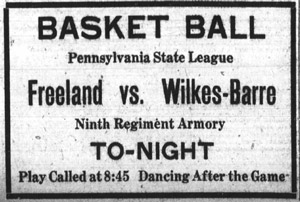 In
what a Wilkes-Barre Times Leader sportswriter called “without doubt
the greatest basketball game every played in this city,” the
Wilkes-Barre Barons defeated the Tigers 32-21 before a sellout crowd of
1,300 in the 9th Regiment Armory to open the Pennsylvania State Basket
Ball League on November 17, 1914.
In
what a Wilkes-Barre Times Leader sportswriter called “without doubt
the greatest basketball game every played in this city,” the
Wilkes-Barre Barons defeated the Tigers 32-21 before a sellout crowd of
1,300 in the 9th Regiment Armory to open the Pennsylvania State Basket
Ball League on November 17, 1914.Franchises in the league were granted to seven towns and cities at a meeting in Wilkes-Barre in August 1915, and rules were adopted that called for installing cages of wire or rope for the protection of spectators and for equipping the courts with uniform baskets and backboards of wood or glass. J. R. Brogan represented the Freeland franchise at the meeting.
With Freeland and Wilkes-Barre fighting for first place in 1915, reserved seats at Timony Hall, sold usually for 10 cents, were being hawked for up to $10. When Sam Curlette sank a foul for the Barons in the second extra period, the Tigers appeared doomed until Effie Welsh, with 5 seconds remaining, got the ball at mid-court and, with his back to the basket, threw the ball over his head for a field goal and a Freeland victory.
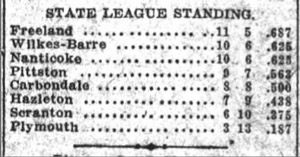 A week later, Freeland
fans snake-danced in the streets before arriving at the 9th Regiment
Armory at 3:45 for the game with the Barons at 9 p.m. Freeland lost
26-22 before a crowd that the Wilkes-Barre Times Leader described as
“the largest that ever saw a game in the state. There wasn't a chance
of getting a seat. The big floor was a mass of humanity when the teams
entered the ‘cage’ and hundreds of people refused to take a chance
standing in the rear. Freeland and Hazleton fans to the number of 600
cheered and howled for the Tigers, but without avail and when the
battle was over they sadly wended their way to the funeral train which
took them back to their native heath.”
A week later, Freeland
fans snake-danced in the streets before arriving at the 9th Regiment
Armory at 3:45 for the game with the Barons at 9 p.m. Freeland lost
26-22 before a crowd that the Wilkes-Barre Times Leader described as
“the largest that ever saw a game in the state. There wasn't a chance
of getting a seat. The big floor was a mass of humanity when the teams
entered the ‘cage’ and hundreds of people refused to take a chance
standing in the rear. Freeland and Hazleton fans to the number of 600
cheered and howled for the Tigers, but without avail and when the
battle was over they sadly wended their way to the funeral train which
took them back to their native heath.” In 1939, a Hazleton Standard-Speaker columnist wrote of that game: “The Lehigh Traction Company sent all of its cars to Freeland, yet fans had to sit out on the roofs to get into town. On reaching Hazleton a new situation developed -- there were not enough Wilkes-Barre & Hazleton Railway cars to carry the throngs to the county seat. A call was sent to the Jersey Central at Ashley, and 10 extra passenger coaches were sent, and these were attached to W.-B. & H. trains, and in this manner the fans were carried to Wilkes-Barre, but half of the number never saw the inside of the arena. Maybe it was just as well, for the Barons won that game.”
Wilkes-Barre won the league pennant that year, but Freeland bore the distinction of being the only team exclusively with homegrown talent, while the other teams hired players from all along the Atlantic seaboard.
The Freeland Tigers took first place in the league in January 1916, and a Wilkes-Barre Record reporter wrote, “Freeland can boast of having a ‘home-talent’ team, and they have good grounds for the boast for Novak, Schaub, Boskoski, Welsh and Johnson are players of the first rank. Wilkes-Barre has one victory over Freeland, and that victory on the Armory floor still rankles in their (Freeland’s) hearts.”
However, a columnist for the Standard-Sentinel wrote in 1939, “It was back in 1916 and 1917 that Billy (Kummer) came on from the west (Butler, Pennsylvania) to join that renowned All-Home Town team of Captain Johnny Novak, Jimmy Brogan, Effie Welsh, Joe Johnson, Alfey Boskosky and the great "Butch" Schaub, a team that set a record for drawing that has never been equalled in Eastern Pennsylvania. Kummer was a great, yes, a truly great player in those days, and Freeland's renown spread throughout the entire United States as the pacemakers of the Penn State League. Freeland lost to the Barons in a playoff and the Barons then became world champions by defeating Paterson.”
Eventually, Freeland was overwhelmed by the deep pockets of its opponents, and attendance dwindled. A Wilkes-Barre Times-Leader sports writer wrote that manager “Jimmy” Brogan and a supporting business association paid the entire Freeland team a total of $163.45 in 1917 while other teams in the league were paying more to a single player. Freeland surrended its franchise to Allentown in October 1917.
Ironically, in December 1917 league managers voted to slash player salaries from a scale that ranged from a top of more than $200 to a bottom of $150 to a new scale that ranged from $150 to $112.50.
Sports writer Thomas Breslin of the Scranton Republican opposed the re-entry of Freeland into the league in 1919. “Freeland was in the league when it was first organized,” he wrote, “but due to the small hall in that town, keeping down the receipts, the owners had to throw up the sponge. Today the same playing and meeting accommodations exist in the town. Just how the promoters figure out how the game can be made to pay there has not been explained.”
The Wilkes-Barre Evening News wrote in 1919 that the league made an overture to Hazleton to rejoin its ranks, and that the offer, if accepted, would mean that Freeland’s effort to rejoin also would be approved in order to keep an even number of teams, at eight.
In the end, when an estimated 75 per cent of its players had been called to serve in the military during World War I, and the flu epidemic swept across the world, the league folded.
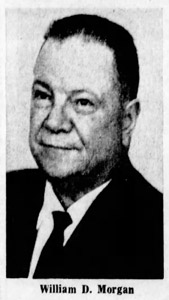 Efforts to revive the league
met with little success until 1932. The Hazleton Plain Speaker reported
on the growing interest with this account from January 30, 1932:
“Bloomsburg State League team will be the opponent of Freeland Y.M.C.A.
basket ball team tonight at Freeland and North Side team officials
expect to handle the biggest crowd that has witnessed a contest there
since the days of the famous Freeland All Home Five of the Penn State
League of many years ago.”
Efforts to revive the league
met with little success until 1932. The Hazleton Plain Speaker reported
on the growing interest with this account from January 30, 1932:
“Bloomsburg State League team will be the opponent of Freeland Y.M.C.A.
basket ball team tonight at Freeland and North Side team officials
expect to handle the biggest crowd that has witnessed a contest there
since the days of the famous Freeland All Home Five of the Penn State
League of many years ago.” Later in 1932, William D. Morgan spearheaded a drive to organize a reconstituted Pennsylvania State Basket Ball League and, along with other boosters, was awarded the franchise for Freeland, which they sold later to John Boyle.
Morgan, a native of Sandy Valley, was employed in 1934 as the North Side News correspondent for the Hazleton Plain Speaker and the Standard-Sentinel. Later he would become a reporter-photographer there before taking over as sports editor in 1943 and managing editor in 1966. He also organized and became the first president of baseball’s Keystone League in 1948.
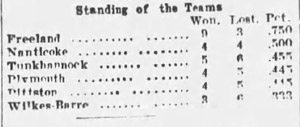 In January
1936, Freeland held first place in the Pennsylvania State Basket Ball
League.
In January
1936, Freeland held first place in the Pennsylvania State Basket Ball
League.Three thousand fans were expected to pack the 9th Regiment Armory in Wilkes-Barre on April 17, 1936, when Freeland and Tunkhannock met in the semifinals of league play. Freeland manager Boyle challenged Tunkhannock to a “winner-take-all” of the night’s receipts. The Wilkes-Barre Evening News reporter wrote, “The teams are so evenly balanced that it will take more than a Solomon to pick the winners.”
Freeland’s home games will be played at the Feeley Hall in Hazleton, the Wilkes-Barre Times Leader reported on January 9, 1937, after manager Boyle rejected a raise in rental rates from $22 to $25 a game demanded by the directors of the Freeland Y.M.C.A.
Boyle sold the Freeland franchise on January 11, 1937, to a group of Freeland sportsmen headed by Walter Fairchild, described as a candy merchant in the Hazleton Standard-Speaker story. Fairchild named Morgan as general manager. An agreement was struck to play home games on the Y.M.C.A. court, where extra bleachers were added to accommodate the expected crowds.
Morgan announced that he would begin negotiations immediately to bring back Frank Serany, former Hazleton High School star, and Joe Rogan, former M.M.I. star. Also on the roster would be Eddie Deitch, former St. Thomas College star, and Freeland’s own Pep O’Neil and Nick Nicholas.
Season tickets were put on sale for $4.50 plus tax at Fairchild’s Candy Store. Club secretary Victor Oleyar announced that new uniforms were being ordered bearing the club’s new name, Fairchild’s Candy Kids.
The Pennsylvania State Basket Ball League disappeared from the news again after the 1937 season, presumably a victim of the Great Depression and World War II.
Final thoughts from Ed: By way of explanation: Research for this story on the web site newspapers.com resulted in 13,966 matches in Freeland area news publications and 24,939 in Wilkes-Barre publications. Obviously, I could not read them all but had to rely on the thumbnail sketch that accompanied each match to determine its value to the narrative, which resulted in gaps in the story. However, the account was never intended to be a detailed history but, rather, a series of vignettes that painted a picture of an astonishing little borough whose people played as hard as they worked.